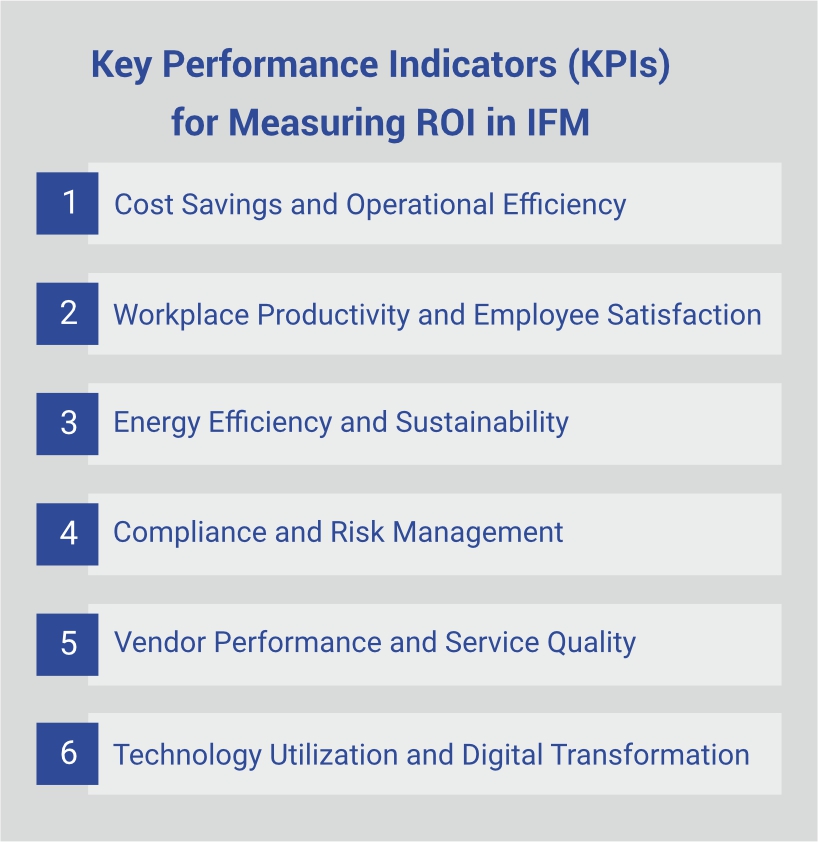Introduction:
Integrated Facility Management (IFM) is a strategic approach that consolidates various facility management services under a single contract to optimize efficiency, reduce costs, and enhance service delivery. For businesses investing in IFM, measuring the return on investment (ROI) is crucial to justify expenditures and highlight the tangible benefits.
In this blog, we will explore the key performance indicators (KPIs) used to measure IFM's ROI and how organizations can demonstrate its value to stakeholders.
Understanding ROI in Integrated Facility Management
ROI in IFM measures the financial and operational benefits of integrating facility management services against the costs incurred. A positive ROI indicates improved efficiency, cost savings, and enhanced workplace productivity. The challenge lies in quantifying these benefits and effectively communicating them to stakeholders.
To accurately measure ROI, organizations must consider both direct financial returns (such as cost savings) and indirect benefits (such as employee productivity and sustainability impact). By evaluating these factors, businesses can ensure that their IFM strategies align with corporate objectives and drive long-term success.
Key Performance Indicators (KPIs) for Measuring IFM ROI

Organizations must establish relevant KPIs to effectively assess the ROI of IFM. Below are some critical KPIs used to measure the success of IFM implementation.
1. Cost Savings and Operational Efficiency
One of the primary reasons companies adopt IFM is to optimize costs. Key metrics include:
- Facility operating costs per square foot – Tracking expenses for utilities, maintenance, and support services per unit of space.
- Reduction in service redundancies – Evaluating how integrating services eliminates inefficiencies and streamlines operations.
- Cost avoidance – Measuring the savings from preventive maintenance that reduces costly emergency repairs.
2. Workplace Productivity and Employee Satisfaction:
IFM directly impacts workplace functionality, influencing employee performance. Relevant KPIs include:
- Employee satisfaction surveys – Gauging how IFM services affect employee experience and comfort.
- Average response time to service requests – Evaluating the efficiency of facility maintenance and issue resolution.
- Facility uptime and equipment availability – Measuring the reliability of critical systems such as HVAC, power, and IT infrastructure.
3. Energy Efficiency and Sustainability
A well-structured IFM approach enhances energy efficiency and sustainability efforts. Important KPIs include:
- Energy consumption per square foot – Analyzing reductions in electricity, water, and fuel usage.
- Carbon footprint reduction – Measuring emissions reduction through sustainable facility management practices.
- Percentage of waste diverted from landfills – Tracking recycling and waste management efficiency.
4. Compliance and Risk Management
Compliance with health, safety, and environmental regulations is critical in IFM. Key metrics include:
- Number of compliance violations or incidents – Tracking adherence to local and international regulations.
- Workplace safety incidents – Evaluating how IFM contributes to a safer work environment.
- Preventive maintenance compliance rates – Measuring adherence to scheduled maintenance tasks to reduce breakdowns.
5. Vendor Performance and Service Quality
IFM involves multiple service providers, making vendor management a critical aspect. KPIs to assess vendor efficiency include:
- Service Level Agreement (SLA) adherence – Measuring whether vendors meet contractual obligations.
- Customer satisfaction with vendor services – Gathering feedback on vendor performance and responsiveness.
- Cost versus value analysis – Evaluating vendor services' cost-effectiveness and impact on facility performance.
6. Technology Utilization and Digital Transformation
Many organizations are leveraging digital solutions to enhance IFM efficiency. Performance indicators include:
- Usage of robotic cleaning machines – Using of robotic cleaning machines and auto scrubbers to reduces cleaning time and improves thoroughness, maintaining high hygiene standards with minimal disruption.
- Data accuracy and real-time reporting – Evaluating the effectiveness of data-driven decision-making.
- Reduction in manual processes – Quantifying how automation reduces administrative workload and errors.
Demonstrating the Value of IFM to Stakeholders
Once the KPIs are established and data is collected, organizations must effectively communicate the value of IFM to stakeholders, including executives, employees, investors, and clients. Here are some strategies for demonstrating IFM’s ROI:
1. Present Data-Driven Insights:
Stakeholders respond well to factual, quantifiable data. Regularly present IFM performance reports highlighting:
- Cost savings achieved through optimized resource utilization.
- Improvements in employee productivity linked to facility management enhancements.
- Sustainability achievements, such as energy savings and reduced carbon footprint.
2. Use Visual Dashboards and Reports
Instead of relying on lengthy reports, leverage digital dashboards and infographics to present performance metrics clearly. Facility management solutions allow real-time tracking of KPIs, making it easier for stakeholders to see progress at a glance.
3. Showcase Case Studies and Success Stories:
Real-world examples of how IFM has improved facility operations can be compelling. Develop case studies demonstrating:
- How preventive maintenance reduced downtime and increased efficiency.
- The impact of streamlined vendor management on service quality and costs.
- The benefits of sustainable practices in reducing environmental impact.
4. Link IFM ROI to Business Goals:
Executives and decision-makers are more likely to support IFM initiatives if they see a direct link to business objectives. Align IFM outcomes with:
- Corporate financial goals (e.g., cost reduction, revenue growth).
- Employee well-being and retention strategies.
- Sustainability commitments and regulatory compliance.
5. Engage Stakeholders in IFM Initiatives:
Encourage participation in IFM programs by involving key stakeholders in:
- Decision-making for facilities and management improvements.
- Workshops on energy efficiency and workplace safety.
- Feedback sessions to ensure IFM aligns with employee and management needs.
5. Engage Stakeholders in IFM Initiatives:
Encourage participation in IFM programs by involving key stakeholders in:
- Decision-making for facilities and management improvements.
- Workshops on energy efficiency and workplace safety.
- Feedback sessions to ensure IFM aligns with employee and management needs.
Conclusion
Measuring the ROI of Integrated Facility Management in India is essential to ensure organizations maximize value from their investment. By leveraging key performance indicators (KPIs), businesses can track financial savings, operational efficiency, sustainability improvements, and service quality enhancements.
Demonstrating IFM’s value to stakeholders requires clear, data-driven communication, compelling case studies, and alignment with overall business goals. By consistently tracking and showcasing the benefits, organizations can strengthen their commitment to integrated facility management, ensuring long-term success and operational excellence.
As the landscape of facility management continues to evolve, embracing data analytics, digital transformation, and sustainability will further enhance IFM’s effectiveness. Organizations that invest in IFM measurement and optimization will ultimately achieve greater cost efficiency, improved workplace environments, and a more sustainable future.
Industries we serve:
Automobile | Manufacturing | Pharmaceutical | Oil and Gas | Healthcare | Ancillary | FMCG | Education | Real Estate | Commercial | Mining | Hotels
Also read: Challenges and Solutions in Implementing IFM

